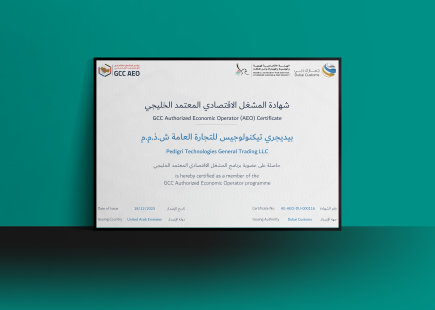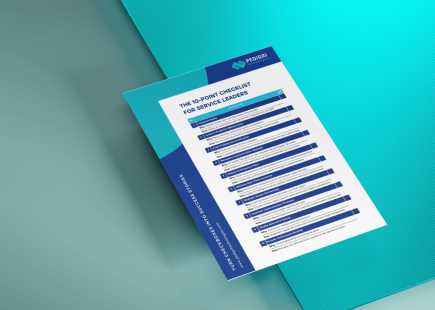How to Choose the Right IOR for Your Mission-critical Equipment and Spare Parts
23 May, 2023Importing high-value, mission-critical equipment and spare parts across international borders often involves complex regulations and strict compliance requirements. Relying on an Importer of Record (IOR) is crucial for ensuring a seamless import process. But how do you choose the right IOR?

This article provides key factors to consider when selecting the ideal IOR for your mission-critical equipment and spare parts.
Experience and Expertise
Experience and expertise sit at the heart of any successful IOR service provider. An experienced IOR has the knowledge and capability to handle complex customs requirements across multiple jurisdictions, minimizing risks and ensuring compliance. An IOR should have a deep understanding of import/export regulations, harmonized system codes, and tax and duty structures in the country where you planning to import to. They must also be knowledgeable about specific product classifications, which vary significantly for different types of mission-critical equipment and spare parts.
Global Reach and Local Knowledge
A competent Importer of Record (IOR) should ideally possess an extensive geographical footprint, enabling it to manage imports across diverse international jurisdictions. This global reach enhances its ability to facilitate efficient, smooth transactions, regardless of the geographic location. However, equally important is the IOR’s local knowledge. The IOR must have a deep understanding of the local import regulations, languages, and business cultures, allowing it to navigate local and regional nuances. This combination of expansive global operations and in-depth local expertise helps the IOR serve as a bridge, connecting the broad operational capacities of a global provider with the specificity and personalized service of a local expert, thus ensuring an efficient, seamless import process.
Integrated Logistics Services
Selecting an Importer of Record (IOR) with integrated logistics services is preferable for streamlined operations. These services, including end-to-end shipping, customs brokerage, and freight forwarding, reduce the need for multiple intermediaries, thus decreasing potential issues. Such an all-encompassing approach mitigates risks such as delays or errors, especially vital for mission-critical equipment and spare parts. Centralizing these services enhances coordination and predictability in the shipping process. Essentially, an IOR offering these integrated services is key to efficient international logistics, ensuring your critical items reach their destination promptly and securely.
Financial Stability
Financial stability stands as a cornerstone in choosing an Importer of Record (IOR). It signifies the IOR’s ability to meet its financial obligations like duties, taxes, and fees in a timely manner. Such capability reduces financial bottlenecks, ensures a smooth import process, and aids in sustaining a positive relationship with customs authorities.
When dealing with mission-critical equipment and spare parts, an IOR’s financial stability becomes even more important. Unforeseen import delays due to financial issues can disrupt operations, impacting productivity and revenue. Therefore, careful evaluation of potential IORs through financial statements, credit ratings, and past performance is essential. In essence, an IOR’s financial stability is a critical benchmark of its credibility and dependability.
Reputable References and Reviews
Investigating the reputation of an Importer of Record (IOR) before establishing a partnership is a crucial step. Delve into the IOR’s market standing by seeking out reviews, references, and case studies. Positive feedback from satisfied clients, especially from industries that closely align with yours, is generally indicative of an IOR’s reliability and competence. Furthermore, consider the IOR’s track record in managing imports of mission-critical equipment and spare parts. An IOR with demonstrated experience and success in this field likely has the required knowledge and capabilities to meet your specific needs. Thoroughly researching potential IORs can help you find a dependable partner well-equipped to handle the complexities of your import requirements.
Robust Compliance Capabilities
Failure to comply may result in financial penalties, asset seizures, and even a complete loss of your valuable assets, as well as a ban on the brand. Therefore, an IOR must have a robust compliance procedure. It’s important to choose an IOR that has a strong focus on compliance and a robust compliance program in place. This includes a thorough understanding of the relevant regulations and laws, as well as processes to ensure that all requirements are met. A reputable IOR will have rigorous systems in place for audit trails and documentation, as well as measures for regulatory changes.
- Compliance Procedures: Prioritize an IOR that demonstrates a well-defined, stringent system of rules and procedures, ensuring adherence to relevant legislation and regulations. The IOR’s approach should involve thorough due diligence of suppliers, validation of product compliance, and proactive management of any compliance issues.
- Dedicated Compliance Experts: Identify an IOR that has an expert team, proficient in all aspects of import or export compliance. Their knowledge should encompass the wide-ranging regulations and laws, coupled with firsthand experience in handling any potential compliance issues throughout the import process.
- Rigorous Compliance Monitoring and Accountability: Seek an IOR equipped with a solid system for vigilant monitoring and reporting compliance. This should include consistent surveillance of compliance-related activities, along with promptly reporting any non-compliance to the corresponding authorities.
- Compliance-oriented Training Programs: Engage with an IOR that cultivates a culture of compliance among its workforce through regular, comprehensive training programs. This will ensure that everyone involved in the import process understands the significance of compliance and possesses the necessary skills to maintain adherence to relevant regulations and laws.
- Third-Party Compliance Audits: Lean towards an IOR that embraces routine external audits to validate their adherence to pertinent regulations and laws. These third-party audits can provide an impartial assessment that the IOR is consistently meeting all crucial compliance requirements.
- Established Compliance Track Record: Opt for an IOR with an unblemished compliance track record. This should include a history of compliance with all relevant regulations and laws, along with a tradition of swiftly addressing any compliance issues that may occur.
Transparency and Communication
Clear and effective communication serves as a cornerstone of any thriving business relationship, including the one you share with an Importer of Record (IOR). By emphasizing transparency and maintaining open channels of communication, an IOR can significantly enhance the fluidity of the import process. It is vital for an IOR to provide consistent updates about your shipment’s status, swiftly alert you to any arising issues, and discuss the steps taken towards resolution.
An IOR of high caliber should employ robust communication channels to ensure seamless information flow during the import process. They should demonstrate keen responsiveness to your queries and concerns and supply regular, real-time updates on your shipment’s progress.
When selecting an IOR, consider the following to assess their commitment to communication and responsiveness:
- Prompt Responsiveness: Gauge the IOR’s level of responsiveness by contacting them through email or a phone call and assessing their response time. An ideal IOR should exhibit promptness in their replies and readiness to attend to queries or swiftly address any arising issues.
- Flexible Communication Channels: Consider the variety and suitability of the IOR’s communication channels. Depending on your comfort, you may prefer specific channels such as email, phone, or video conferencing. Ensure the IOR caters to these preferences to facilitate smooth and effective communication.
- Proficiency in Language: When engaging with an IOR in a foreign country, it’s imperative to ascertain their language proficiency. They should exhibit fluency in your preferred language of communication to prevent any potential miscommunication or misunderstandings.
- Valuable Testimonials and References: Seek out testimonials and references from other businesses that have previously partnered with the IOR. These insights can shed light on the IOR’s communication style, commitment to responsiveness, and overall approach to client relations. Such firsthand accounts can offer a more holistic view of the IOR’s communication proficiency.
Cost
The cost of the IOR services is also an important consideration. You should evaluate the fees charged by the IOR to ensure that they are reasonable and competitive with other providers in the market. The cost of an IOR (Importer of Record) can vary depending on several factors, such as the type and quantity of goods being imported, the complexity of the import process, and the location of the IOR. Some IORs may charge a flat fee for their services, while others may charge a percentage of the value of the goods being imported.
It’s important to note that selecting an IOR based solely on cost may not always be the best approach. The lowest-priced option may not necessarily offer the best service or have the necessary expertise to ensure compliance with all relevant regulations and laws.
Location and network
The geographical location and network of the Importer of Record (IOR) indeed play a crucial role in your selection process. An IOR with a robust presence in the regions where your equipment and spare parts originate can provide several advantages. Their close proximity to the source can facilitate better control over the supply chain, allowing for more efficient coordination and quicker response to any emerging issues.
Additionally, their established network in these regions can contribute to smoother customs clearance, given their familiarity with local import regulations and procedures. Therefore, when selecting an IOR, considering their location and the extent of their regional network can be instrumental in ensuring a seamless and efficient import process.
Flexibility
The flexibility of an Importer of Record (IOR) can significantly influence your import operations’ success. A flexible IOR can adapt to your specific demands, showcasing their capability to manage intricate shipments, cater to unique requirements, and offer bespoke solutions. Whether it involves handling specialized mission-critical equipment, adjusting to tight timelines, or responding to changes in the regulatory environment, a flexible IOR should rise up to the occasion, adjusting their strategies accordingly. Their agility and adaptability can prove to be a game-changer in navigating the intricacies of international logistics, ensuring that your unique needs are met, and that the import process runs smoothly and efficiently.
Certifications
Certifications are an important consideration when choosing an Importer of Record, as they can serve as a testament to the provider’s credibility and professional standards. These credentials affirm that the IOR has met certain industry or regulatory benchmarks, demonstrating their competence and reliability in managing the import process. Additionally, these accreditations not only affirm an IOR’s compliance with globally recognized standards, but they also offer assurance of their commitment to quality service, adherence to ethical practices, and ability to handle intricate logistics of import operations.
Here are some of the certifications you may want to look for:
- ISO Certifications: An IOR possessing ISO certifications demonstrates adherence to international process standards across various areas, such as quality management and environmental management. This illustrates their commitment to delivering quality services, upholding environmental responsibility, and meeting specific requirements in other areas.
- Global Trade Compliance Program (GTCP): An IOR certified by the GTCP, a program devised by the National Customs Brokers & Forwarders Association of America, shows their dedication to implementing best practices for trade compliance, adding an extra layer of assurance for their clients.
- Foreign Trade Association (FTA) Social Compliance Audit: If social responsibility aligns with your business ethos, an IOR passing an FTA Social Compliance Audit can be an ideal choice. This audit assesses an IOR’s adherence to labor and human rights standards, environmental norms, and other facets of social responsibility.
- Customs Trade Partnership Against Terrorism (C-TPAT): A C-TPAT certification, a voluntary program run by the U.S. Customs and Border Protection, attests to an IOR’s commitment to securing their supply chain against security threats. Companies with this certification have demonstrated strong protective measures for their supply chains, enhancing their credibility.
- Authorized Economic Operator (AEO): An AEO certification, recognized by customs authorities in the EU and other countries adhering to the World Customs Organization’s SAFE Framework of Standards, signifies a company’s compliance with customs regulations and dedication to supply chain security.
- Industry-Specific Certifications: Depending on your industry’s unique demands, you might consider specific certifications. For instance, if you’re importing medical devices, an IOR certified by the International Medical Device Regulators Forum (IMDRF) can ensure that they understand and comply with industry-specific regulations and standards.
Technology
In the digital age, IT is an essential element to consider when selecting an Importer of Record (IOR). The use of advanced technology can significantly enhance the import process, bolstering efficiency and improving overall performance. Incorporating technology into import operations allows for the automation of routine tasks, which can save time, reduce errors, and free up resources. It can also facilitate real-time tracking and reporting, ensuring transparency and enabling you to make informed decisions.
Furthermore, the integration of advanced IT systems can enable smoother communication between you and the IOR, providing a platform for timely updates and swift responses to queries or concerns. Cybersecurity is another crucial aspect where technology can help, ensuring that sensitive information related to your imports is adequately protected.
- Supply Chain Management Software: An effective IOR can employ advanced supply chain management software for tracking shipments and managing inventory. Such software enhances operational efficiency and offers real-time insights into the import process, keeping you informed and in control.
- Tracking and Reporting Tools: Opt for an IOR that provides robust tracking and reporting tools, enabling you to monitor the status of your shipments and receive instant updates. Such real-time insights empower you to make informed, timely decisions about your import activities.
- Integration Capabilities: An IOR’s ability to integrate seamlessly with your existing systems and software is crucial. This capability streamlines the import process, reducing the need for manual data entry, and ensures a smoother, more efficient workflow that aligns with your existing operations.
- Customs Compliance Software: Prioritize an IOR that utilizes sophisticated customs compliance software to adhere to relevant regulations and laws. By automating the compliance process, this software significantly reduces the risk of errors or non-compliance instances, ensuring a smoother import operation.
- Electronic Data Interchange (EDI): An IOR using EDI capabilities demonstrates their commitment to efficient and reliable information exchange with customs authorities and other stakeholders. By replacing traditional paper-based processes, EDI reduces time and costs, streamlining the entire import process.
Reliable Importer of Record Partnerships with Pedigri Technologies
Importer of Record (IOR) for your mission-critical equipment and spare parts is a decision that requires careful consideration. It is crucial to evaluate factors such as experience, reputation, compliance capabilities, communication, cost, location, flexibility, certifications, and technology. By thoroughly assessing these aspects, you can select an IOR that will meet your needs and contribute to the successful import of your essential equipment and spare parts.
At Pedigri Technologies, we offer over 25 years of experience in optimizing speed, efficiency, and compliance in your import and regulatory processes. As a trusted IOR, we specialize in reducing import time in the MEA region for high-value equipment and critical spare parts.
Contact our team to learn more.
Latest news

The Imperative of Denied or Restricted Party Screening in Supply Chains
Imagine the supply chain as a complex network of blood vessels in a living organism. Just as the health of an organism depends on the purity of what flows through these vessels, so does the health of a supply chain rest on the integrity of its participants.

Pedigri Technologies Becomes AEO-Certified Company
Pedigri Technologies, a leading orchestrator of high-value equipment and mission-critical supply chains, is proud to announce becoming a member of the GCC Authorized Economic Operator programme.

The Ultimate Checklist for Service Leaders
When managing mission-critical equipment, one second of downtime can have a ripple effect across your organization, affecting revenue and brand credibility. Are you prepared to tackle these challenges? Download the complete checklist for Service Leaders.
